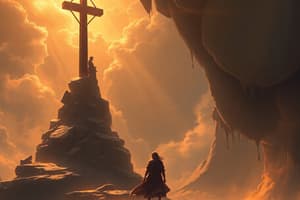Podcast
Questions and Answers
Which worldview emphasizes the responsibility of individuals to create their own meaning and purpose in life?
Which worldview emphasizes the responsibility of individuals to create their own meaning and purpose in life?
- Agnosticism
- Postmodernism
- Nihilism
- Existentialism (correct)
Beauty is universally defined and does not vary between different cultures.
Beauty is universally defined and does not vary between different cultures.
False (B)
Name one philosophical worldview alternative mentioned in the content.
Name one philosophical worldview alternative mentioned in the content.
Nihilism
________ is a religious worldview that incorporates the idea of divinity in reality and the cosmos.
________ is a religious worldview that incorporates the idea of divinity in reality and the cosmos.
Which worldview rejects the concepts of rationality and universal truth?
Which worldview rejects the concepts of rationality and universal truth?
Match the following worldviews with their description:
Match the following worldviews with their description:
Conflict in society can occur due to differing worldviews among individuals.
Conflict in society can occur due to differing worldviews among individuals.
What is a common characteristic of beauty according to varying worldviews?
What is a common characteristic of beauty according to varying worldviews?
Which of the following definitions best describes 'worldview'?
Which of the following definitions best describes 'worldview'?
David Naugle defines a Christian worldview primarily as a set of cultural norms.
David Naugle defines a Christian worldview primarily as a set of cultural norms.
What analogy is used to explain how a worldview affects our perception of the world?
What analogy is used to explain how a worldview affects our perception of the world?
A worldview serves as a _____ and a compass that guides, directs, and orients our lives.
A worldview serves as a _____ and a compass that guides, directs, and orients our lives.
Which of the following is NOT an illustration of what a worldview does?
Which of the following is NOT an illustration of what a worldview does?
Match the definitions to their corresponding authors:
Match the definitions to their corresponding authors:
Worldviews contain an irreducible _____ component, which is at their core.
Worldviews contain an irreducible _____ component, which is at their core.
According to Abraham Kuyper, a worldview is solely a collection of thoughts about facts.
According to Abraham Kuyper, a worldview is solely a collection of thoughts about facts.
What does a dominant worldview in society strive to do?
What does a dominant worldview in society strive to do?
A Christian worldview does not consider Scripture to have authority over public opinion.
A Christian worldview does not consider Scripture to have authority over public opinion.
What does culture shock illustrate in relation to worldviews?
What does culture shock illustrate in relation to worldviews?
Any worldview is primarily ________.
Any worldview is primarily ________.
Match the following terms with their descriptions:
Match the following terms with their descriptions:
What is a key characteristic of how a Christian worldview perceives human nature?
What is a key characteristic of how a Christian worldview perceives human nature?
Conflicts between different worldviews can arise from misunderstandings of right and wrong.
Conflicts between different worldviews can arise from misunderstandings of right and wrong.
The basic nature of all things is their ________ to God.
The basic nature of all things is their ________ to God.
What is the primary purpose of history according to the Philosophical Christian Worldview?
What is the primary purpose of history according to the Philosophical Christian Worldview?
Sin is viewed as an inevitable part of human existence in the Philosophical Christian Worldview.
Sin is viewed as an inevitable part of human existence in the Philosophical Christian Worldview.
What event signifies the beginning, middle, and end of history in the Philosophical Christian Worldview?
What event signifies the beginning, middle, and end of history in the Philosophical Christian Worldview?
The person and work of ______ accomplished redemption for humanity.
The person and work of ______ accomplished redemption for humanity.
Match the results of redemption to their descriptions:
Match the results of redemption to their descriptions:
Which of the following is NOT a result of redemption as outlined in the Philosophical Christian Worldview?
Which of the following is NOT a result of redemption as outlined in the Philosophical Christian Worldview?
The Philosophical Christian Worldview teaches that history is a form of revelation.
The Philosophical Christian Worldview teaches that history is a form of revelation.
What hope do believers have according to the Philosophical Christian Worldview?
What hope do believers have according to the Philosophical Christian Worldview?
What are the options concerning the afterlife according to the Christian view?
What are the options concerning the afterlife according to the Christian view?
The fall of humanity indicates a separation of humanity from God, leading to a perfect relationship.
The fall of humanity indicates a separation of humanity from God, leading to a perfect relationship.
What is the primary purpose of humans according to the creation decree found in Genesis?
What is the primary purpose of humans according to the creation decree found in Genesis?
According to Genesis 1:31, God's creation was described as 'very __________.'
According to Genesis 1:31, God's creation was described as 'very __________.'
Match the following consequences of the human rebellion with their respective types:
Match the following consequences of the human rebellion with their respective types:
What is the essence of humanity's fall according to the content?
What is the essence of humanity's fall according to the content?
What is the ultimate outcome of death according to the content?
What is the ultimate outcome of death according to the content?
Redemption is fully completed in the New Testament.
Redemption is fully completed in the New Testament.
Cultural purpose includes the establishment of marriage and family.
Cultural purpose includes the establishment of marriage and family.
What is the role of Jesus Christ in the redemption narrative?
What is the role of Jesus Christ in the redemption narrative?
What does St. Augustine imply about human restlessness?
What does St. Augustine imply about human restlessness?
The coming of Christ brings God's kingdom to earth, triumphing over _____.
The coming of Christ brings God's kingdom to earth, triumphing over _____.
Match the following aspects of redemption to their descriptions:
Match the following aspects of redemption to their descriptions:
Which of the following represents a consequence of Christ's coming?
Which of the following represents a consequence of Christ's coming?
The second coming of Jesus is associated with establishing God's kingdom on earth.
The second coming of Jesus is associated with establishing God's kingdom on earth.
What does the term 'already' signify in the context of redemption?
What does the term 'already' signify in the context of redemption?
Flashcards
Worldview
Worldview
A person's fundamental beliefs about the nature of reality, and their place in it.
Beauty
Beauty
A quality in things that is pleasing to the senses and mind.
Ugliness
Ugliness
A quality in things that is unpleasing or offensive to the mind.
Agnosticism/Skepticism
Agnosticism/Skepticism
Signup and view all the flashcards
Atheism/Naturalism
Atheism/Naturalism
Signup and view all the flashcards
Nihilism
Nihilism
Signup and view all the flashcards
Secular Humanism
Secular Humanism
Signup and view all the flashcards
Conflict of Worldviews
Conflict of Worldviews
Signup and view all the flashcards
Christian Worldview
Christian Worldview
Signup and view all the flashcards
Worldview Formation
Worldview Formation
Signup and view all the flashcards
Worldview as a Lens
Worldview as a Lens
Signup and view all the flashcards
Worldview as a Narrative
Worldview as a Narrative
Signup and view all the flashcards
Worldview as a Guide
Worldview as a Guide
Signup and view all the flashcards
Worldview as a Filter
Worldview as a Filter
Signup and view all the flashcards
Worldview as a Framework
Worldview as a Framework
Signup and view all the flashcards
Worldview Conflict
Worldview Conflict
Signup and view all the flashcards
Culture Shock
Culture Shock
Signup and view all the flashcards
Dominant Worldview
Dominant Worldview
Signup and view all the flashcards
Scripture's Authority
Scripture's Authority
Signup and view all the flashcards
Religious Nature of Worldviews
Religious Nature of Worldviews
Signup and view all the flashcards
Human Nature (Christian POV)
Human Nature (Christian POV)
Signup and view all the flashcards
Creatureliness and Dependence (Christian POV)
Creatureliness and Dependence (Christian POV)
Signup and view all the flashcards
Afterlife Options
Afterlife Options
Signup and view all the flashcards
Heaven (Christian)
Heaven (Christian)
Signup and view all the flashcards
Hell (Christian)
Hell (Christian)
Signup and view all the flashcards
Human Image of God
Human Image of God
Signup and view all the flashcards
Human Purpose (spiritual)
Human Purpose (spiritual)
Signup and view all the flashcards
Human Purpose (social)
Human Purpose (social)
Signup and view all the flashcards
Human Purpose (cultural)
Human Purpose (cultural)
Signup and view all the flashcards
Human Rebellion (Genesis 3)
Human Rebellion (Genesis 3)
Signup and view all the flashcards
Christian Worldview on History
Christian Worldview on History
Signup and view all the flashcards
Teleological History
Teleological History
Signup and view all the flashcards
Heilsgeschichte
Heilsgeschichte
Signup and view all the flashcards
Sin's Effect
Sin's Effect
Signup and view all the flashcards
Redemption Through Jesus
Redemption Through Jesus
Signup and view all the flashcards
God's Kingdom
God's Kingdom
Signup and view all the flashcards
Eternal Life
Eternal Life
Signup and view all the flashcards
Reconciliation
Reconciliation
Signup and view all the flashcards
Human Fall
Human Fall
Signup and view all the flashcards
Redemption
Redemption
Signup and view all the flashcards
Old Testament
Old Testament
Signup and view all the flashcards
New Testament
New Testament
Signup and view all the flashcards
Jesus' First Coming
Jesus' First Coming
Signup and view all the flashcards
Jesus' Second Coming
Jesus' Second Coming
Signup and view all the flashcards
Kingdom of God
Kingdom of God
Signup and view all the flashcards
Incarnation
Incarnation
Signup and view all the flashcards
Study Notes
Course Information
- Course Name: Christian Worldview
- Course Code: CWV1106
- Course Lecturer: Atlee Charles M'buka BA, PDT, MTh, PhD (Candidate)
Lesson Objectives
- Students will understand the meaning of "worldview."
- Students will understand the meaning of "Christian worldview."
- Students will learn about the formation of worldviews.
Worldview Definition
- Worldview is a comprehensive view of the universe and humanity's place in it.
- It's a fundamental principle that shapes a complex understanding of reality.
- A worldview is a whole system of thought that answers life's critical questions.
- It's a framework of basic beliefs about existence.
- A worldview includes the encompassing view of the world along with the resulting way of life.
Illustrating Worldview
- Worldview is like lenses (glasses, sunglasses, etc.) through which we see the world (colouring how we see).
- Worldview works like contact lenses which affect everything you see, but you can't see or feel the filter.
Worldview Functions
- A map and a compass (used for navigation).
- A filter and framework (used to sort and filter information, and explain a community's life).
Worldview Content
- A worldview is a narrative that provides a fundamental framework for understanding the cosmos and how to order life.
- It contains an irreducible narrative component (fundamental base that forms the core, matrix , and essence).
- A worldview is story-formed, and consists of a fundamental myth and various sub-stories that explain the whole world and how to live in it.
- Worldview narratives typically include a setting, characters, conflict, and resolution (Where are we? Who are we? What is wrong? and What is the remedy?).
Big Questions
- Worldviews answer the fundamental philosophical, theological, religious, and spiritual questions about God, the universe, the world, and human existence.
Big Worldview Questions
- The nature and works of God (His existence, nature and what He is like)
- The nature of ultimate reality and the origin, nature and destiny of evil
- The possibility and nature of knowledge (What is truth, the origin of knowledge, justification, and goals?)
- The origin, nature, and destiny of the universe
- The origin, nature and destiny of human beings (Who am I? Why am I here? Where am I going?)
- What should we be like and live as people? How should people live?
- What is the nature of beauty as expressed through human imagination, artistry, and creativity?
- Is history cyclical, linear, or repetitive?
- How can human beings be redeemed, changed, and find hope?
Philosophical Implications
- Worldviews reflect beliefs about reality's deepest aspects (nature of reality).
- Worldviews have significant implications for many aspects of life - epistemology, ethics, aesthetics, and teleology (how life is meant to be)
Epistemological Implications
- The function and nature of rational thoughts and their relationship to our worldview.
Ethical and Aesthetic Implications
- Worldviews establish standards for what is good (ethical) and beautiful (aesthetic).
- What is good(ethical) and beautiful (aesthetic) for human beings and what the ultimate meaning of life is.
Worldview Alternatives
- Agnosticism/Skepticism: belief it's impossible to know if God exists.
- Atheism/Naturalism: belief that God doesn't exist.
- Nihilism: belief that nothing has any real existence.
- Secular Humanism: belief that humans are the centre of life.
- Existentialism: belief that humans are responsible for creating their own purpose and meanings in life.
- Theism: belief that God exists.
- Judaism: a monotheistic religion worshipping the God of Israel/Abraham.
- Christian Theism: belief in the existence of the Christian God and his/her son, and his work /teachings.
- Islamism: belief in the existence of the Muslim God.
- Buddhism: A non-theistic religion that focuses on the truth that suffering is unavoidable but can be overcome.
- Taoism: an ancient Chinese belief system which instructs believers on how to live in harmony with the universe.
- Confucianism: an ancient Chinese belief system which focuses on personal ethics and morality.
- Pantheism/Hinduism: belief that reality, the universe and the cosmos are identical with a supreme being.
Conflict of Worldviews
- Different worldviews lead to conflicts in society because people define morality through different perspectives on right and wrong, truth, possibilities.
Christian Worldview
- A Christian worldview is a way of life and understanding the universe, grounded in the authority of Scripture.
- A Christian worldview is influenced by God's word to interpret the totality of life's experiences.
- Christianity believes that God created this universe, and everything within it.
- A Christian worldview is defined by its belief in God and his work.
Biblical Christian Worldview
- Creation: History is linear, moving toward God's ultimate purpose. Creation, Fall, and Redemption.
- Creation accounts for humanity's place and responsibilities.
- Fall: The Fall is an explanation of how evil, injustice, and suffering came into existence.
- Redemption: A solution or remedy to the problem of sin and how redemption can be achieved through the work of Christ.
- God's plan for the universe is detailed within the narratives of the Bible.
Philosophical Christian Worldview
- God's attributes (metaphysics)
- The world's relationship to God (Cosmology)
- Human beings' nature and purpose (anthropology)
- How humans can know God and achieve right relationship with Him (Epistemology)
- Basis of Morality (ethics/moral philosophy)
- Beauty and Art (aesthetics)
Religion in a Christian Worldview
- Religion is the fundamental part of a Christian worldview, that guides a person’s understanding of reality and purpose.
- A Christian view sees that religion forms the base of human nature and the relationship between humans and God.
- The entirety of human life, actions, thoughts, and responses relate to a fundamental relationship with God.
- The nature of God is the foundation of morality and truth, which is established in scriptures.
Studying That Suits You
Use AI to generate personalized quizzes and flashcards to suit your learning preferences.




